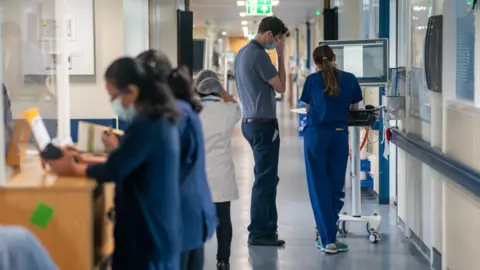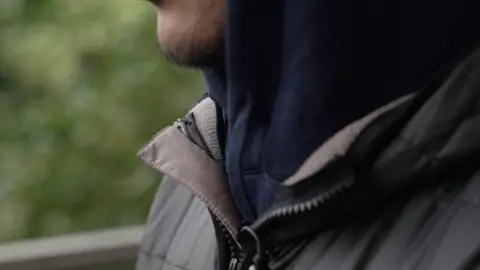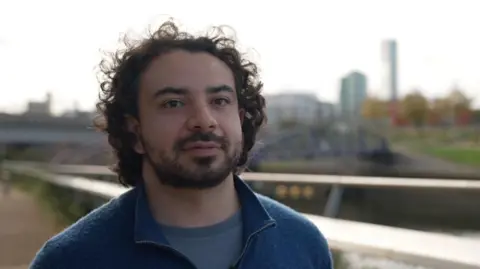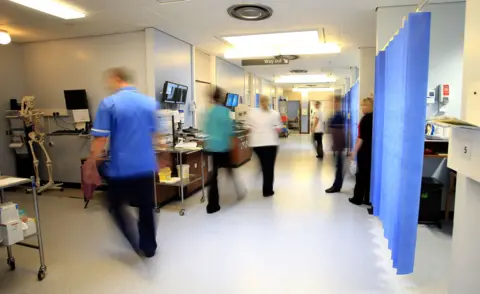Hospitals forgive £112m in bills for overseas patients
 PA media
PA mediaLondon hospitals have written off more than £112m in unpaid treatment bills for foreign patients between 2018 and 2023, according to figures obtained by the BBC.
Under current NHS rules, hospital trusts in England must charge patients who are not “ordinarily resident” in the UK for non-urgent treatment.
Critics argue that the current system for compensating these costs is unfair and ineffective.
The Department of Health and Social Care (DHSC) said it expected all NHS trusts to recover any fees not paid in advance wherever possible.
The BBC contacted all 32 acute hospital trusts in London about their overseas patient billing.
The responding NHS trusts invoiced a total of £223m for such treatments over a five-year period, but £112m was later written off as bad debt.
 getty images
getty imagesAlthough emergency and GP services are free for all, trusts have to bill for other types of non-urgent treatment for patients who do not usually live in the UK and charge 150% of standard NHS rates.
This premium is to cover the administrative burden of identifying patients and processing payment.
While aimed at combating “health tourism”, the charging system has exemptions for vulnerable groups, including asylum seekers and trafficking victims.
But hospitals often struggle to recoup costs, especially when patients return abroad.
Trusts balance their legal obligation to recover costs and the realities of treating needy patients, many of whom have limited means or face other barriers to payment.
Barts Health, serving a large population in East London, wrote off £35 million in unpaid bills over five years – the highest of all responding London trusts.
A spokesperson said: “Where appropriate, we make every effort to recover payments from patients who are liable for the cost of their treatment.
“However, many patients may have limited funds available and some may not be resident in the UK, meaning it may be difficult to recover payments.”
‘Fairness and proportionality’
‘I feel like a negative person here’

The British Medical Association (BMA) has consistently criticized the charging policy, arguing that it prevents vulnerable groups from accessing essential health care while diverting NHS staff time from patient care.
Patients like Benny, who asked the BBC to change his name, say it could be devastating.
Benny, a disabled man applying for UK residency, was selected by a London hospital trust for £495 after attending two hospital appointments for a prosthetic leg fitting.
“It was a terrible experience or a negative experience because the hospital treated me very badly and treated me even more aggressively, even though I am disabled and I needed some help,” she told the BBC.
“I felt like I was a negative person here, because I couldn’t do anything. Can’t work, I couldn’t do anything.”
“They charged me £495 just for the test, and it was very expensive for me because I couldn’t work at the time and had no income.
“So, I tried to pay it monthly for a long time until I made it through.”

The BMA also says that doctors should have no role in assessing patients’ eligibility for free NHS care.
Dr Omar Forge Risk, who campaigns against charging NHS fees for overseas patients, said the charging system is harmful to public health.
“The reality is that if (patients) are paying more, it will push them into poverty,” he said.
“After all, if you’re charging patients and pushing them into poor health and poverty, the costs will be higher in the long run than either approach.”
‘Health tourism is a big problem’
 PA Media
PA MediaThe BBC spoke to several doctors who described their experiences with the charging system, although they did not want to be identified.
An emergency medicine practitioner who previously worked in London said he had “many patients” who came to this country from different countries with kidney failure because they could not get treatment or found it too expensive to get dialysis in their own country. Was. ,
One oncologist in central London argued that “health tourism is a big problem, it’s a huge problem”.
“Everyone knows the NHS is independent in terms of care and most doctors would say it is not their responsibility to oversee the system,” he said.
“It’s difficult when a patient is desperate for care. Policing needs to happen at an earlier stage.”
‘Max value’
Government modeling published by the then Health Secretary Jeremy Hunt in 2023 estimated that charging overseas patients more consistently could bring in an extra £500 million per year for the NHS.
However, the true extent of unpaid bills is unclear, as the £223m invoice only reflects patients identified as chargeable, while many others may have received unbilled treatment.
The current government has defended the charging system and said that “tens of millions of pounds” are charged each year.
A DHSC spokesperson said: “Overseas visitors – and those who are not legally settled here – should contribute to their treatment while keeping the extra cost to the NHS at bay.
“We are committed to achieving maximum value for taxpayers’ money.”
Listen to the best of BBC Radio London sound And follow BBC London Facebook, x And InstagramSubmit your story ideas here hello.bbclondon@bbc.co.uk



